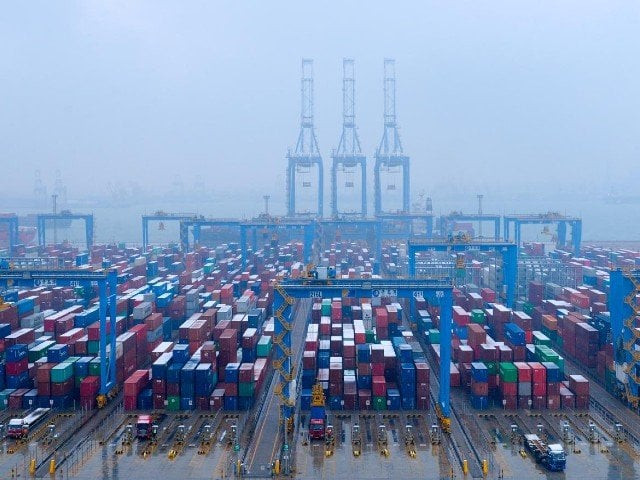Global economies take a hit from Covid-19 pandemic
Economic damage to different sectors across the globe has come as a major shock for all the countries

Economic damage to different sectors across the globe has come as a major shock for all the countries. PHOTO: REUTERS/FILE
With continuous rise in the health and human toll, the economic damage to different sectors across the globe has come as a major shock for all the countries. This downward trend is said to have attributed to the total global GDP loss of $9 trillion. This economic snapshot reflects the economic outlook of many countries.
Though Pakistan still fares well when compared with the global projected figures.
Govt spends Rs544.8b in grants
According to available data, the projected change in GDP of various countries in the year 2020 as compared to 2019 would remain as follows in case no second wave of the coronavirus emerges:
UK -11.5%, France -11.4%, Italy -11.3%, Spain -11.1%, Euro area -9.1%, Russia -8%, Canada -8%, Brazil -7.4%, US -7.3%, Germany -6.6%, Japan -6%, India -3.7% and China -2.6%.
Comparing with the above numbers, Pakistan's GDP next year is estimated to stand around - 0.4.
According to the Economic Survey of Pakistan, the country’s gross domestic product (GDP) was estimated to have faced Rs3 trillion loss. The GDP was expected to increase by three per cent with the support of economic policies, but it would now go down by -0.4pc.
Further reliable figures revealed that the United States' GDP during the current quarter was down by 48% and that of the United Kingdom by 20.4% in the month of April alone.
The European Union's GDP, which is 20% of the global GDP, saw its sharpest decline in the last 14 years.
Despite pandemic, remittances rise 4.6% in May
According to the World Bank's latest report, the baseline forecast envisions a 5.2 per cent contraction in the global GDP in 2020, using market exchange rate weights—the deepest global recession in decades, despite the extraordinary efforts of governments to counter the downturn with fiscal and monetary policy support.
The pandemic is expected to plunge most countries into recession in 2020, with per capita income contracting in the largest fraction of countries globally since 1870. Advanced economies are projected to shrink by 7 per cent.
“Every region is subject to substantial growth downgrades. East Asia and the Pacific will grow by a scant 0.5%. South Asia will contract by 2.7%, Sub-Saharan Africa by 2.8%, Middle East and North Africa by 4.2%, Europe and Central Asia by 4.7%, and Latin America by 7.2%,” the report said.
The WB further warns that the advanced economies are projected to shrink by 7 per cent. That weakness will spill over to the outlook for emerging markets and developing economies, who are forecast to contract by 2.5 per cent as they cope with their own domestic outbreaks of the virus.
The government of Pakistan took drastic efforts to net the fast economic recession by reopening various sectors, including construction, industry and agriculture with strict adherence to the standard operating procedures (SOPs), which are considered as major wheels of economic growth, besides rolling out the biggest Ehsaas support programme for provision of succour to the big vulnerable segments of the society.
An amount of Rs122.99 billion has so far been distributed among a total of 10,118,814 beneficiaries under various categories.
The situation in the neighbouring country also reeled under the economic shocks after the Modi’s government imposed one of the world’s harshest Covid-19 lockdowns.
According to Pranab Pardhan, a renowned economist, Narendra Modi has inflicted unprecedented damage on India’s economy and on the poor, who live hand-to-mouth at the best of times.
According to some estimates, more than 120 million people lost their jobs and incomes immediately after the lockdown was ordered in India on March 24. And about half of the country’s population of 1.38 billion is likely to have been impoverished, with many approaching starvation levels.
After weeks of callous disregard for the plight of tens of millions of migrant workers, the government announced two months of grain rations. The workers were hungry and homeless since suddenly losing their jobs, and with public transportation locked down, many had no choice but to walk hundreds of miles with luggage and children to their villages out of which hundreds died on the way.
In general, the Indian government’s response had largely excluded hundreds of millions of daily wage labourers and urban workers. The Modi government also ignored the pressing need for a large-scale transfer of central funds to near-bankrupt state governments that had been covering most of the spending on health care, agriculture, and social protections, and had little capacity to borrow at low cost.
“Weighed against the scale of the looming disaster, the government’s fiscal response has been pitiably small, still amounting to a mere 1% of GDP or so,” the writer said.



















COMMENTS
Comments are moderated and generally will be posted if they are on-topic and not abusive.
For more information, please see our Comments FAQ